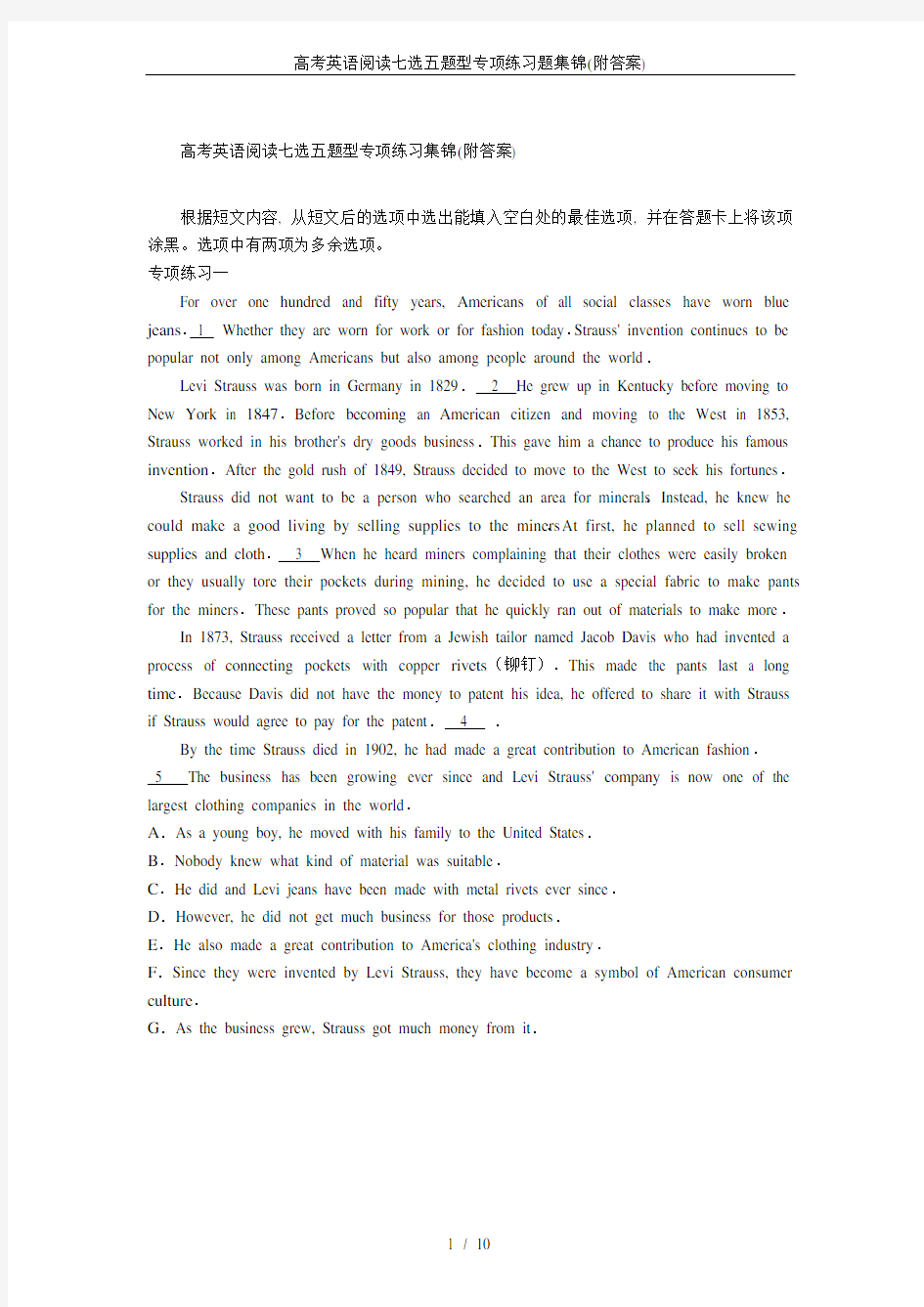
(完整版)高考英语阅读七选五题型专项练习题集锦(附答案)
- 格式:doc
- 大小:56.51 KB
- 文档页数:10


高考英语阅读七选五题型专项练习集锦(附答案)
根据短文内容, 从短文后的选项中选出能填入空白处的最佳选项, 并在答题卡上将该项涂黑。选项中有两项为多余选项。
专项练习一
For over one hundred and fifty years, Americans of all social classes have worn blue jeans.1 Whether they are worn for work or for fashion today.Strauss' invention continues to be popular not only among Americans but also among people around the world.
Levi Strauss was born in Germany in 1829. 2 He grew up in Kentucky before moving to New York in 1847.Before becoming an American citizen and moving to the West in 1853, Strauss worked in his brother's dry goods business.This gave him a chance to produce his famous invention.After the gold rush of 1849, Strauss decided to move to the West to seek his fortunes.Strauss did not want to be a person who searched an area for minerals.Instead, he knew he could make a good living by selling supplies to the miners.At first, he planned to sell sewing supplies and cloth. 3 When he heard miners complaining that their clothes were easily broken or they usually tore their pockets during mining, he decided to use a special fabric to make pants for the miners.These pants proved so popular that he quickly ran out of materials to make more.In 1873, Strauss received a letter from a Jewish tailor named Jacob Davis who had invented a process of connecting pockets with copper rivets(铆钉).This made the pants last a long time.Because Davis did not have the money to patent his idea, he offered to share it with Strauss if Strauss would agree to pay for the patent. 4 .
By the time Strauss died in 1902, he had made a great contribution to American fashion.
5 The business has been growing ever since and Levi Strauss' company is now one of the largest clothing companies in the world.
A.As a young boy, he moved with his family to the United States.
B.Nobody knew what kind of material was suitable.
C.He did and Levi jeans have been made with metal rivets ever since.
D.However, he did not get much business for those products.
E.He also made a great contribution to America's clothing industry.
F.Since they were invented by Levi Strauss, they have become a symbol of American consumer culture.
G.As the business grew, Strauss got much money from it.
Recently some American scientists have given a useful piece of advice to people in industrialized nations.They say people should eat more of the same kind of food eaten by humans living more than 10,000 years ago. 1
The scientists say that the human life has changed greatly.Our bodies have not been able to deal with these changes in lifestyle and this had led to new kinds of sicknesses.2 So they are called "diseases of civilization".Many cancers and diseases of the blood system are examples of such diseases.
Scientists noted that people in both the Old Stone Age and the New Stone Age enjoyed very little alcohol or tobacco, probably none. 3 However, a change in food is one of the main differences between life in ancient times and that of today.
Stone Age people hunted wild animals for their meat, which had much less fat than domestic ones.They ate a lot of fresh wild vegetables and fruits.They did not have milk or any other dairy products, and they made very little use of grains. 4 We eat six times more salt than our ancestors.We eat more sugar.We eat twice as much fat but only one third as much protein and much less vitamin C.
5 But scientists say that we would be much healthier if we eat much the same way the ancient people did, cutting the amount of fatty, salty and sweet food.
A.Stone Age people lived a simple life.
B.But today, we enjoy eating a lot of these.
C.In that case, they would live much healthier.
D.Ancient people also got lots of physical exercise.
E.These new sicknesses were not known in ancient times.
F.People today probably don't want to live like our ancestors.
G.Modern people used to suffer from "diseases of civilization".